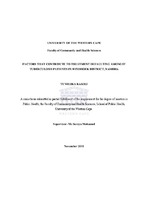Factors that contribute to treatment defaulting amongst tuberculosis patients in Windhoek district, Namibia
Abstract
Background: Tuberculosis (TB) is a resurgent disease in many parts of the world, fuelled by HIV/AIDS and poverty. According to WHO, over two billion people were estimated to be infected by TB globally, 9.4 million new cases of TB were reported, while about 1.7 million people were estimated to have lost their lives to TB in 2009 (WHO, 2010). The global defaulter rate for TB was estimated at about 9% in 2007 (WHO, 2007). With Africa remaining the global epicentre of the TB epidemic, the epidemic in Sub-Saharan Africa, one of the worst affected areas in the world, shows no evidence of decline (WHO, 2008). According to the 2009 MOHSS annual report, 1300 people lost their lives to TB in Namibia (MOHSS, 2010). The introduction of TB treatment saves many lives globally. However, despite this effort, TB patients have been reported to default treatment in many parts of the world including Namibia. Namibia reported a defaulter rate of 10% above the national target of less than 5% (Maletsky, 2008). Aim: This study aimed to investigate the factors that contribute to treatment defaulting amongst TB patients at a major health centre in Windhoek district, Namibia. Methodology: A descriptive qualitative study using in-depth interviews was conducted among ten TB defaulters. Key informant interviews were also conducted with the two TB nurses based at the health centre. Eligible participants were purposively selected. A thematic content analysis of transcribed data was conducted where themes related to patient’s experiences of the illness; socio- economic; community, family, cultural and religious as well as health system factors were drawn out. Results: The study results indicate that defaulting TB treatment is a big challenge to TB management. The reasons for defaulting given by respondents were complex and included patient factors such as medication related factors, lack of knowledge and information as well as alcohol abuse. The findings also revealed unemployment as a major socio-economic factor that contributes to defaulting. In addition, the study shows that community, family, religious and cultural factors such as poor family support, work-related factors and religious and cultural beliefs have an influence on defaulting. Accessibility to health care services, sharing of the TB department with ART patients and attitudes of health workers were identified as health service factors that influence treatment defaulting. This study also highlights the relationship between some of these factors. Conclusion: The study concludes that no single factor contributed to treatment defaulting amongst TB patients in the selected health centre in Windhoek district and this concurred with the literature. There are many different factors at different levels that have an influence on TB treatment defaulting. An interrelationship between personal, socio- economic, community, family, religious and cultural as well as health services- related factors was evident What makes it more complex is that these factors also impact on each other and therefore a holistic approach in the management of TB is required to address these factors. Recommendations based on the findings of the study are made.

